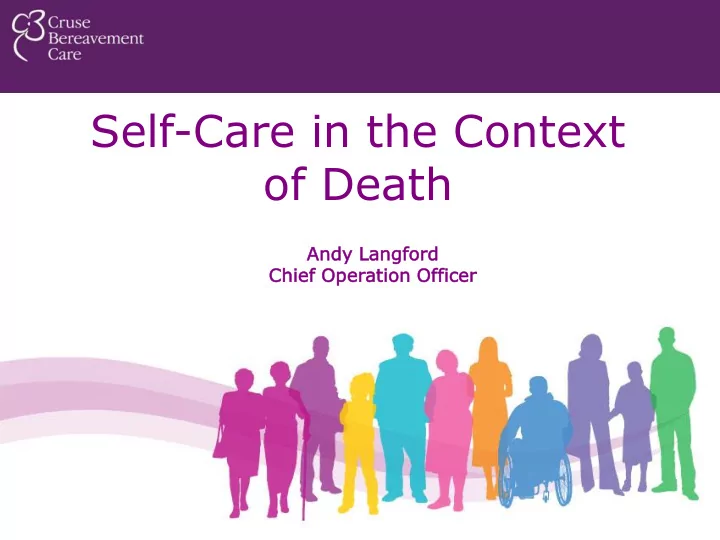

Self-Care in the Context of Death Andy dy La Langf gford ord Chie ief Operatio ion n Office icer
Somewhere to Turn when Someone Dies
Being Aware of the Need Over 500,000 people die in the UK each year 3-4 people affected by each bereavement
Self-Care • Why is it so important? • Why do we need to bother about this? • What is particular in relation to death?
Aims of the Workshop • Explore what we experience as helpers • Barriers to self-care • What we can do to care for ourselves
Exercise 1 What are your immediate physical, emotional, cognitive and behavioural reactions to: Dea Death
Sources of Fatigue and ‘Burnout’ • Work overload • Lack of control • Insufficient reward • Breakdown of community • Unfairness • Significant value conflict • Lack of fit between the person and the job
How Does It Feel? • Exhaustion, including emotional exhaustion • Cynicism • Ineffectiveness • Frustration Skovholt and • Disengagement Trotter- Mathison (2011) • Stress • Helplessness/hopelessness
Other Manifestations • Compassion fatigue (Dorji, 2017, in Counselling Australia) • Secondary trauma (Cieslak et al, 2013 and 2014) • Vicarious trauma (Perlman and Saakvitne, 1995) • Secondary victimisation (Figley, 1982) “Vicarious trauma is the emotional residue of exposure that counselors have from working with people as they are hearing their trauma stories and become witnesses to the pain, fear, and terror that trauma survivors have endured.” (American Counseling Association)
Exercise 2 • What are your initial reactions? • How does the subject of death affect you internally? • How would the subject of death affect you as a therapist, in your approach to the client? • How would this potentially impact upon your wider life?
Models of Self Care • Ethical imperative (Frame and Stevens- Smith, 1995) • Self-compassion (Neff, 2003): – Gentleness to oneself in the face of perceived failure – Positively relating to the self – How we deal with inadequacy – Self care as regular acts of self compassion (Coaston, 2017)
• Reflective practice: – Evaluating own performance – Developing self-awareness – Monitoring potential for burnout – Ensuring adequate self-care “As important as methods may be, the most practical thing we can achieve in any kind of work is insight into what is happening inside us as we do it. The more familiar we are with our inner terrain, the more sure footed our [work] – and living- becomes.” P . J. Palmer (cited in Skovholt, T. M., 2001)
Exercise 3 • What are your own barriers to caring for yourself? • What do you want to do to care for yourself (that is realistic)? • Name 1 goal to help you care for yourself more
Thank you and any questions?
Recommend
More recommend